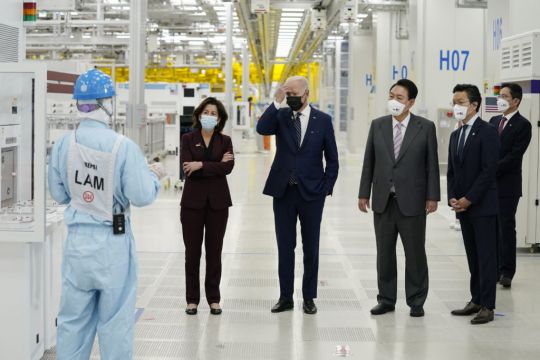US President Joe Biden has opened his trip to Asia with a focus on the computer chip shortage that has hit the world economy.
He toured a Samsung computer chip plant that will serve as a model for a 17 billion dollar semiconductor factory that the Korean electronics company plans to open in Texas.
The visit was a nod to one of Mr Biden’s key domestic priorities of increasing the supply of computer chips.
A semiconductor shortage last year hurt the availability of cars, kitchen appliances and other goods, causing higher inflation worldwide and crippling Mr Biden’s public approval among US voters.
I’m on my way to the Republic of Korea and Japan for my first trip to Asia as president. I look forward to strengthening vital security alliances, deepening our economic partnerships, and working with fellow democracies to help shape the rules of the road for the 21st century.
Advertisement— President Biden (@POTUS) May 20, 2022
Mr Biden will grapple with a multitude of foreign policy issues during a five-day visit to South Korea and Japan, but he also crafted an itinerary clearly meant to tend to the concerns of his home audience as well.
Previewing the trip aboard Air Force One, White House national security adviser Jake Sullivan said Samsung’s investment in Texas will mean “good-paying jobs for Americans and, very importantly, it will mean more supply chain resilience”.
Greeting Mr Biden at the plant in South Korea was the country’s new president, Yoon Suk Yeol, and Samsung Electronics vice chairman Lee Jae-yong.
Mr Yoon is a political newcomer who became president, his first elected office, slightly more than a week ago. He campaigned on taking a tougher stance against North Korea and strengthening the 70-year alliance with the US.
The chip plant showed the unique nature of manufacturing as visitors were required to don laboratory coats and blue boots to help keep the facility clean.

Mr Biden and Mr Yoon, who did not wear protective clothing, saw a demonstration of the machinery, including two pieces of American-made equipment for producing semiconductors.
“These little chips,” Mr Biden said in remarks at the plant, “are the key to propelling us into the next era of humanity’s technological development.”
Part of the computer chip shortage is the result of strong demand as much of the world emerged from the coronavirus pandemic. But coronavirus outbreaks and other challenges also caused the closure of semiconductor plants.
US government officials have estimated that chip production will not be at the levels they would like until early 2023.
More than 75% of global chip production comes from Asia. That is a possible vulnerability the US hopes to protect against through more domestic production and billions worth of government investment in the sector through a bill being negotiated in Congress.

The risk of Chinese aggression against Taiwan could possibly cut off the flow of high-end computer chips that are needed in the US for military gear as well as consumer goods.
Similarly, North Korea has been test-firing ballistic missiles amid a coronavirus outbreak, a possible risk to South Korea’s manufacturing sector should the brinksmanship escalate.
In terms of chip production, China leads the global pack with a 24% share, followed by Taiwan (21%), South Korea (19%) and Japan (13%). Only 10% of chips are made in the US, according to the Semiconductor Industry Association.
Samsung announced the plant in Texas in November 2021. It hopes to begin operations in the second half of 2024. The South Korean electronics giant chose the site based on a number of factors, including government incentives and the “readiness and stability” of local infrastructure.







